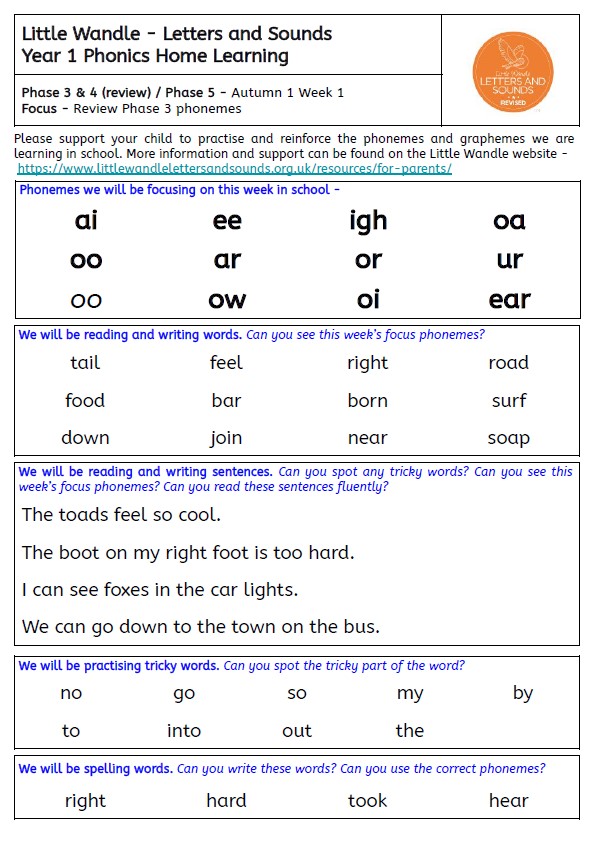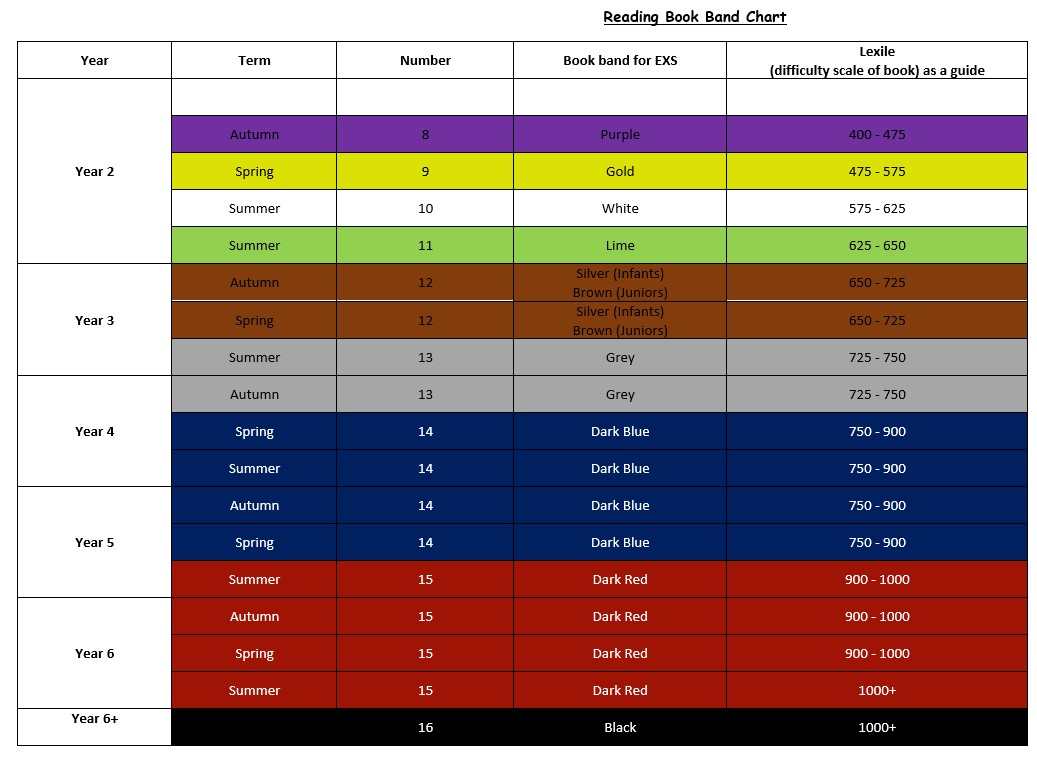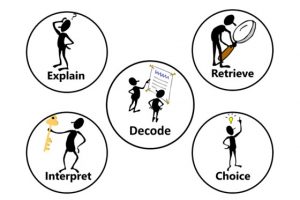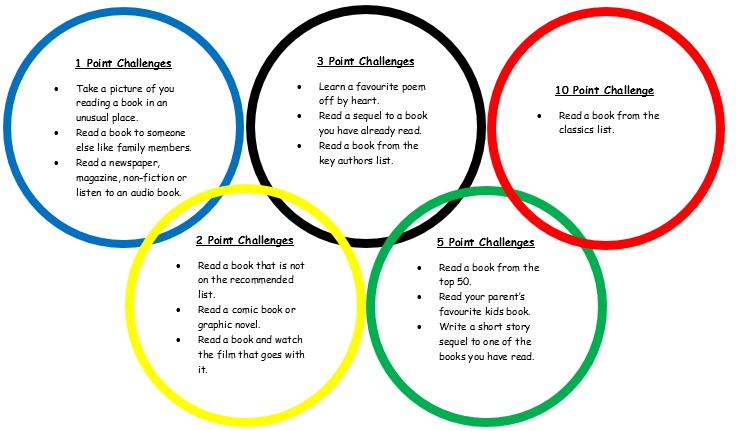Our Approach to Reading
At Emmer Green Primary School, we recognise that reading is the most fundamental skill that children need to learn. Reading is an essential skill for participation in all areas of life. Our core aim is for children to become confident and independent readers who gain not only understanding, but also real pleasure from the reading activities and texts they engage with.
Here is what our children say about reading (Reading for Pleasure Surveys: Pupil View):
The National Curriculum states:
“All pupils must be encouraged to read widely across both fiction and non-fiction to develop their knowledge of themselves and the world in which they live, to establish an appreciation and love of reading, and to gain knowledge across the curriculum. Reading widely and often increases pupils’ vocabulary because they encounter words they would rarely hear or use in everyday speech. Reading also feeds pupils’ imagination and opens up a treasure-house of wonder and joy for curious young minds.” (National Curriculum 2014)
We have many pages on this website devoted to reading. Children and parents alike will find book recommendations, articles and book reading videos in the 'Reading Corner' area of our website. You will also find links to our junior Reading Olympiad challenges here and many resources for help with phonics. For more support and resources for parents with phonics and reading, please click here.
How is Reading systematically taught at Emmer Green Primary School?
Reception & Year 1
Here is a link to our Early Reading Policy.
Phonics (reading and spelling)
At Emmer Green Primary School we strongly believe that every child can become a fluent reader and writer. This is why we teach reading through Little Wandle Letters and Sounds Revised, which is a systematic and synthetic phonics programme (SSP). We start teaching phonics in Reception and follow the Little Wandle Letters and Sounds Revised progression, which ensures children build on their growing knowledge of the alphabetic code, mastering phonics to read as quickly as possible and then to spell accurately as they move through school. For more details on the progression of Little Wandle Letters and Sounds, please click here.
For a look at our parent presentation for Phonics from March 2023, please click here.
Comprehension
At Emmer Green Primary we see reading as a crucial life skill. By the time children leave us, they read confidently for meaning and read for pleasure, equipped with the tools to tackle unfamiliar vocabulary. Our early readers are taught comprehension skills from the very beginning during their group reading sessions. We encourage our children to see themselves as readers for both pleasure and purpose.
Because we believe teaching every child to read is so important, we have a Reading Leader who drives the early reading programme in our school and ensures that everyone teaches with fidelity to the Little Wandle Letters and Sounds Revised programme. All of our KS2 staff are trained in Little Wandle Letters and Sounds so that the programme can continue into the juniors when needed and so there is a full understanding of previous learning.
Implementation (Early Reading)
Daily phonics lessons in Reception and Year 1
- We teach phonics for 30 minutes a day. In Reception, we build from 10-minute lessons, with additional daily oral blending games, to the full-length lesson as quickly as possible. Each Friday, we review the week’s teaching to help children become fluent readers.
- Children make a strong start in Reception: teaching begins in Week 2 of the Autumn term.
- We follow the Little Wandle Letters and Sounds Revised expectations of progress:
- Children in Reception are taught to read and spell words using Phase 2 and 3 GPCs, and words with adjacent consonants (Phase 4) with fluency and accuracy.
- Children in Year 1 review Phase 3 and 4 and are taught to read and spell words using Phase 5 GPCs with fluency and accuracy.
Every week, parents receive a summary of the sounds we are learning that week, as well as some simple ideas to support this learning at home. These sheets are put into book folders and look like this:

Keep-up lessons ensure every child learns to read
Any child who needs additional practice has Keep-up Support, taught by a fully trained adult. Keep-up lessons match the structure of class teaching, and use the same procedures, resources and mantras, but in smaller steps with more repetition, so that every child secures their learning.
We timetable phonics lessons for any child in Year 2 or 3 who is not fully fluent at reading. These children urgently need to catch up, so the gap between themselves and their peers does not widen. We use the Little Wandle Letters and Sounds Revised assessments to identify the gaps in their phonic knowledge and teach to these using the Keep-Up resources – at pace.
If any child in Year 3 to 6 has gaps in their phonic knowledge when reading or writing, we plan phonics ‘catch-up’ lessons to address specific reading/writing gaps.
Teaching reading: Reading practice sessions two or three times a week
- We teach children to read through reading practice sessions in two longer or three shorter sessions a week. These:
- are taught by a fully trained adult to small groups of children
- use books matched to the children’s secure phonic knowledge using the Little Wandle Letters and Sounds Revised assessments and book matching grids
- are monitored by the class teacher, who rotates and works with each group on a regular basis.
- Each reading practice session has a clear focus, so that the demands of the session do not overload the children’s working memory. The reading practice sessions have been designed to focus on three key reading skills:
- decoding
- prosody: teaching children to read with understanding and expression
- comprehension: teaching children to understand the text.
- In Reception, these sessions start in Week 4. Children who are not yet decoding have daily additional blending practice in small groups, so that they quickly learn to blend and can begin to read books.
- In Years 2 and 3, we continue to teach reading in this way for any children who still need to practise reading with decodable books, as well as any other KS2 children who are on a personalised curriculum.
Home Reading
The decodable reading practice book is taken home to ensure success is shared with the family. Reading records are provided for parents to record their home reading with their child, comments on strengths and weaknesses and so that teachers can see how much reading is taking place at home. Follow up discussions on home reading are held at Parents Evening meetings.
Reading for pleasure books also go home for parents to share and read to children. These books are clearly labelled ‘please read to your child’ (e.g. pictures books, more difficult chapter books) or ‘please read with your child’ (e.g. books which are mostly but not fully decodable and so children may require assistance with some words).
We use the Little Wandle Letters and Sounds Revised parents’ resources to engage our families and share information about phonics, the benefits of sharing books, how children learn to blend and other aspects of our provision, both online and through workshops.
Ensuring consistency and pace of progress
- Every teacher and teaching assistant in our school has been trained to teach reading, using the Little Wandle Letters and Sounds Revised programme, so we have the same expectations of progress. We all use the same language, routines and resources to teach children to read so that we lower children’s cognitive load.
- Weekly content grids map out each element of new learning to each day, week and term for the duration of the programme.
- Lesson templates, Prompt cards and How to videos ensure teachers all have a consistent approach and structure for each lesson. This supports less confident members of staff and those newer to the school.
- The Reading Leader and SLT use monitoring grids to regularly monitor and observe teaching; they use the summative data to identify children who need additional support and gaps in learning.
Assessment
Assessment is used to monitor progress and to identify any child needing additional support as soon as they need it.
- Assessment for learning is used:
- daily within class to identify children needing Keep-up support
- weekly in the Review lesson to assess gaps, address these immediately and secure fluency of GPCs, words and spellings.
- Summative assessment is used:
- every six weeks to assess progress, to identify gaps in learning that need to be addressed, to identify any children needing additional support and to plan the Keep-up support that they need.
- by SLT and scrutinised through the Little Wandle Letters and Sounds Revised assessment tracker, to narrow attainment gaps between different groups of children and so that any additional support for teachers can be put into place.
Statutory assessment
Children in Year 1 sit the Phonics Screening Check in June. Any child not passing the check re-sits it in Year 2.
Ongoing assessment for catch-up
Children in Year 2 to 6 are assessed through their teacher’s ongoing formative assessment as well as through the half-termly Little Wandle Letters and Sounds Revised summative assessments where needed.
Further Phonics and Early Reading resources for parents
How to say the sounds:
https://www.littlewandlelettersandsounds.org.uk/resources/for-parents/
How we teach tricky words, blending and alien words
https://www.littlewandlelettersandsounds.org.uk/resources/for-parents/
Below is a narrated video presentation explaining our approach to Early Reading and Phonics.
Additional Resources:
There is lots more information available on the "Supporting Learning at Home -> Reading" sub-menu of this website, which you can also directly access using this link.
Reading in Year 2
When children have completed the Little Wandle Letters and Sounds reading books and fluency assessment (typically by the end of Year 1), they move onto book band colours, beginning at Purple, which then continue through to Year 6. Here is the progression of the book band colours from Purple upwards and a general guide of age expected level (EXS). Please remember that all children progress at their own rates though and reading widely and very regularly is important.

Children are assessed using the PM Benchmarking scheme until they reach infant Silver band (this equates to junior Brown band); this ensures children progress onto the next band of reading books when they are ready and can comprehend, as well as decode the texts.
In Year 2, guided reading is timetabled weekly: books are also colour banded to ensure this allows opportunities to apply the sound covered in phonics lessons. Shared reading takes place daily across the curriculum and there are almost daily opportunities for independent reading.
- Children who require extra reading practice have one to one reading with the teacher or TA at least once a week
- Whole class reading takes places once a week from Term 3 to Term 6 and this enables children to look at comprehension skills more closely with the teacher modelling more challenging skills such as inference.
- Story time is daily, with children encouraged to share their ideas and opinions on the class story through Book Talk.
- Colour banded books are sent home twice a week with opportunities for parents to hear their child read and comment in the reading record book.
Every classroom is equipped with a well-stocked book corner, including a range of picture books, poetry and longer chapter books. - The Silver Reading Challenge book list is offered to those children who have achieved the silver book band to keep them reading high quality and age appropriate texts. These books are shared with all children during Story Time.
- Children in Year 2 have a rota to ensure everyone has the chance to take home Reading Bears. The children read every night to these bears for a week to gain a reward and encourage more reluctant readers.
Reading in KS2
As they begin KS2 in Year 3, most pupils are increasingly secure in their decoding and so the teaching of reading is now directed towards developing their vocabulary and the breadth and depth of their reading, making sure that they become independent, fluent and enthusiastic readers who read widely and frequently. However, those children who do need further development of their decoding skills will continue on the Little Wandle Letters and Sounds programme, as previously detailed, whilst still receiving exposure to the whole class reading texts through story time and whole class reading.
Moving through into Years 5 and 6, we expect that all pupils are able to read aloud age-appropriate interest book level texts with accuracy and at a reasonable speaking pace. They should be able to read most words effortlessly and to work out how to pronounce unfamiliar written words with increasing automaticity. At this age, children are encouraged to read silently, with good understanding, inferring the meanings of unfamiliar words, and then discuss what they have read in partners, groups and as a whole class. Story time still plays an important role in Years 5 and 6, alongside book talk.
By the time children leave us, we strongly aim for every child to be a sufficiently fluent, effortless reader, ready to manage the general reading demands of the curriculum in Year 7, across all subjects and not just in English. We also intend that they leave us with a love of literature, a wide reading experience behind them and many fond memories of the books studied during their primary years at Emmer Green Primary, which they may one day wish to share themselves.
Whole Class Reading
Whole Class reading is timetabled for two or three times a week in KS2 and focuses on important skills for comprehension and is known as ERIC sessions:
Explain: Discussing vocabulary in context and discussing understanding of whole texts
Retrieve: Finding Information in the text
Interpret: Inference skills (with an emphasis on using evidence)
Choice: Focus on author’s choice of words and layout.

Each session focuses on a key skill and ensure the teacher can model approaches to finding answers within texts and explaining processes. Children are encouraged to try a range of techniques when forming meaning from texts such as:
- Making connections
- Thinking-aloud
- Visualisation
- Predicting
- Questioning and question-making
- Summarising
- Seeking clarification
- Robust vocabulary instruction
In these sessions, the children cover a wide range of materials such as :
- Class novels
- Short stories
- Non-fiction related to other curriculum areas
- Text from websites
- Comics
- Poems
- Song lyrics
- Pictures and photos
- Newspapers
- Biographies
Home Reading in KS2
Children continue on through the book bands, choosing their own book within this band to ensure engagement and interest. Any children who find it difficult to choose their own texts are assisted by staff and peer recommendations. Books are categorised largely through using the Lexile scale, taking into account publisher recommendations where needed. For more information on the Lexile scale, please click here: https://lexile.com/

Children’s progress in reading is reviewed by their teacher on a regular basis and book bands changed to reflect this progress. Teachers listen to children read during whole class reading and other curriculum subjects to assess fluency, prosody and pace, as well as one-to-one where needed. Alongside this, children in KS2 complete summative assessments three times a year and these results are analysed to set individual reading targets for each child.
Reading records for children in Year 3 & 4 are used to comment on reading progress but also to communicate and encourage reading at home
Reading record for children in Year 5 & 6 are to keep a record of their personal reading and for parents listening to reading at home. Reading at home habits are discussed and reviewed at Parents Evening meeting or more regularly as required. At the beginning of the year, parents are provided with a bookmark which has questions to check their child’s understanding of what they are reading and to support in developing comprehension skills.
Click on the links below to see these bookmarks.
Reading at Home bookmark for Reception Year
Reading at Home bookmark for Year 1
Reading at Home bookmark for Year 2
Reading at Home bookmark for Year 3
Reading at Home bookmark for Year 4
Reading at Home bookmark for Year 5
Reading at Home bookmark for Year 6
Throughout the school. English writing units begin with reading activities related to genre to ensure good understanding of the texts and many of these units are based on recommendations from the Pie Corbett Talk for Writing scheme which uses high quality texts.
Read Theory
From Year 4 onwards, children are provided with login accounts and are set short weekly reading activities on the website Read Theory which they are expected to complete as part of their homework timetable. https://readtheory.org/
These are short extracts with reading comprehension questions and are based on Lexile levelled texts. This provides the children with further opportunities to practise and apply reading comprehension skills, as well as hints and tips to support them.
The Reading Olympiad
To encourage children to read more often and choose age appropriate texts, we at Emmer Green Primary run our own Reading Olympiad. This is because we want to encourage every child to find something to love reading. We also want to encourage parents to engage with the Olympiad, both by helping their child to find and read good books, and by reading themselves.
The Olympiad is personalised for Years 3, 4, 5 and 6 respectively with a list of 50 top books, categorised by genre. Guides for parents and pupils in each year group are linked below. The guides provide details of the Olympiad including hints and tips supporting your child and encouraging reading, as well as lists of recommended books and authors across a range of genres.
Children earn points towards Bronze, Silver and Gold awards. There is also a chance to earn extra points by completing challenges. Achievements in the Reading Olympiad are celebrated in our weekly whole school assembly, with recognition for achieving Gold.

Other Reading Activities in KS2
- Buddy Reading for Year 5 provided by very confident Year 3 readers
- The Junior library provides a range of fiction and non-fiction books and is run during lunchtimes by our keen and well-trained Year 5 librarians
- Every classroom is equipped with a well-stocked book corner, with new stock added often. Parental donations and gifts made through our Amazon wish list mean that we are able to keep our stocks current and inviting.
How do we encourage children to read for pleasure at Emmer Green Primary School?
When you read often and with enthusiasm, usually just for the sheer fun of it, you lay foundations that last for life. You empathise. You access information more easily. Almost by osmosis you internalise the essential skills of spelling, grammar and vocabulary. You learn to express yourself verbally and in writing. You learn to interpret and potentially change your world.” (Alan Gibbons, Author)
Please click here for further information on Reading For Pleasure on our dedicated web page.


